
Newsletter Subscribe
Enter your email address below and subscribe to our newsletter
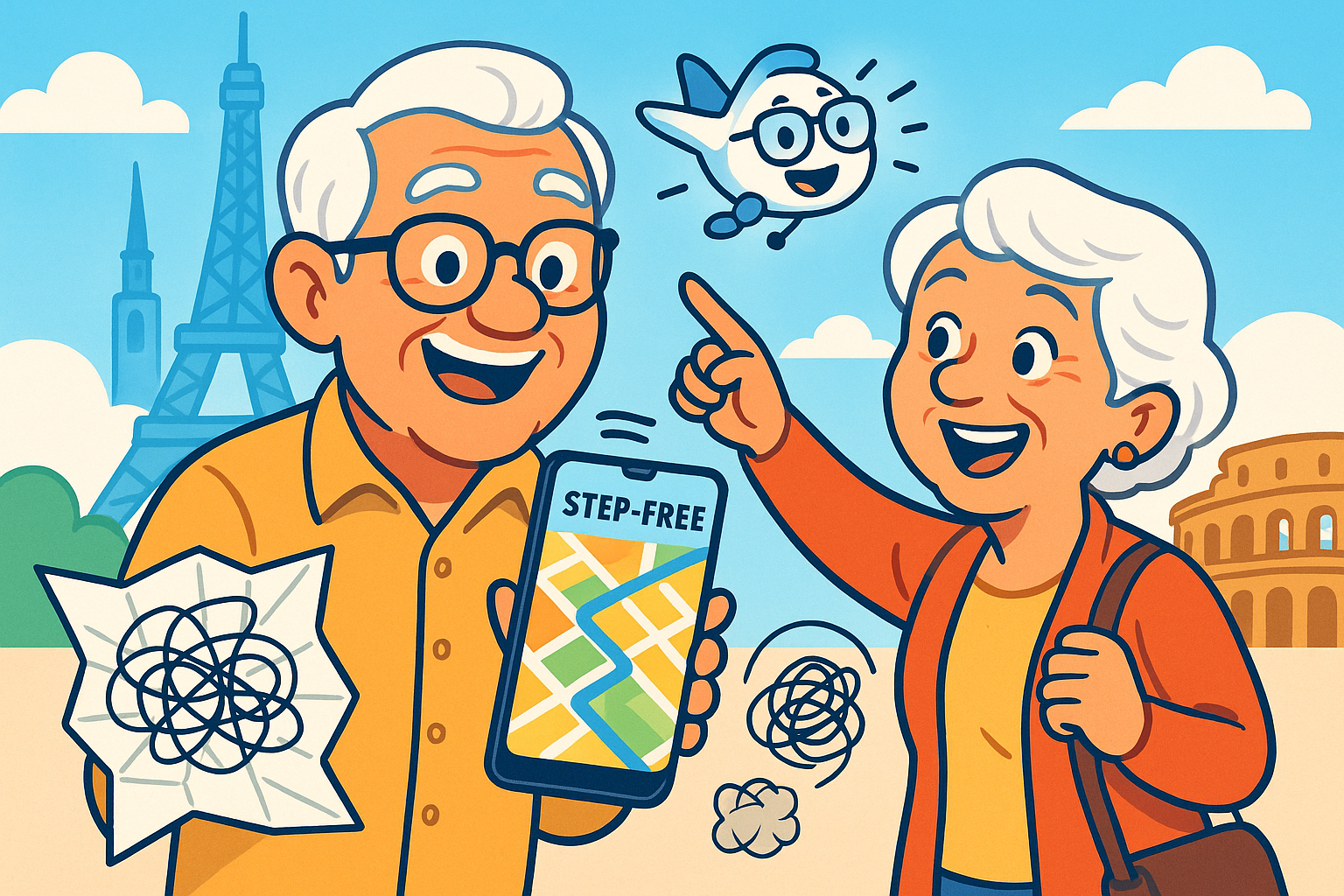
Planning a trip used to feel like a second career. Find a hotel with a walk-in shower. Check if the restaurant has steps… and then another set of steps to the restroom. Try to decode a menu written in a language you don’t speak.
At some point, staying home with a mystery novel felt like the saner adventure.
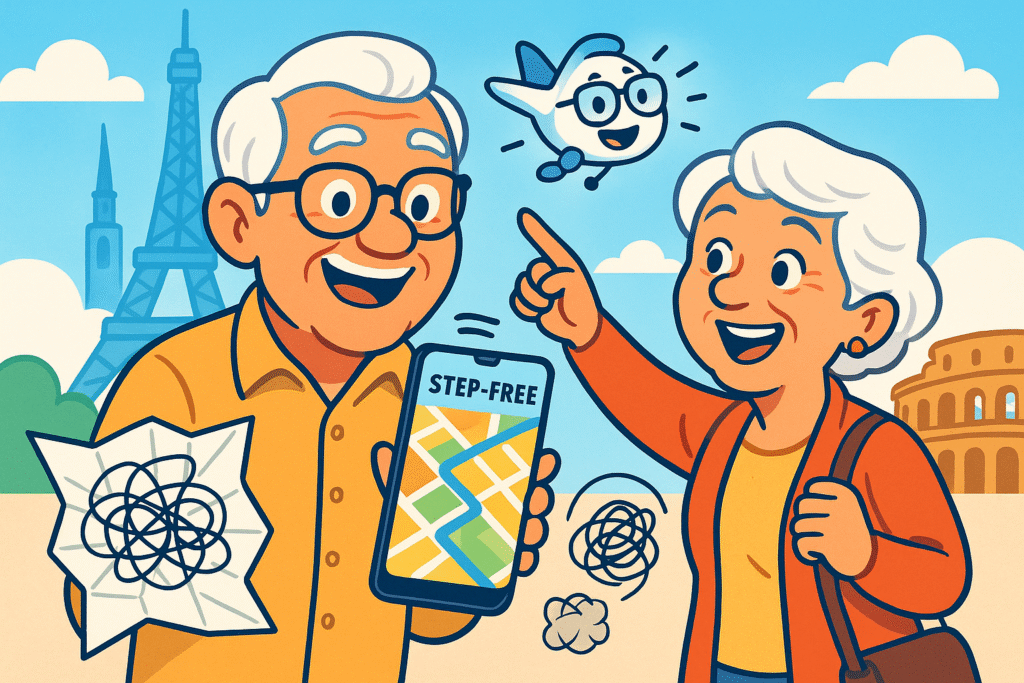
But now there’s help. A new travel companion that handles the planning, the navigating, even the translating.
No, not your endlessly patient grandchild. (Though they do come in handy.) We’re talking Artificial Intelligence—your digital co-pilot for stress-free senior travel.
Forget the tech headaches. This isn’t rocket science. It’s AIArtificial Intelligence (AI) is basically when computers get smart—really smart. Imagine if your c... More made simple—helping you pick the best options, dodge the hassles, and actually enjoy the trip.
Traveling in your golden years should be about joy, discovery, and maybe a little bit of indulgence—not a marathon of logistical hurdles. That’s where AI steps in.
It’s not about robots taking over your vacation; it’s about smart tools helping you craft the perfect trip, navigate with ease, and feel more secure every step of the way.
Think of it as having a super-savvy travel agent, a personal navigator, and a real-time translator all rolled into one, tirelessly working in your pocket.
Let’s face it, senior travelers often have unique considerations.
Mobility might be a concern, navigating unfamiliar cities can be daunting, language barriers can lead to awkward (but sometimes hilarious) misunderstandings, and managing health needs while away from home requires extra thought.
Packing patience is always a good idea, but packing a digital co-pilot? Even better.
The good news is, you’re already more tech-savvy than you might think!
A recent AARP study found that a whopping 94% of travelers aged 50 and over are at least somewhat comfortable using travel technology, and 77% regularly use navigation apps like GoogleGoogle is a multinational technology company known for its internet-related products and services, i... More Maps during their travels.
It turns out, seniors are embracing technology not just for fun, but for practical reasons: 85% see it as a way to save money, and 77% value the time it saves.
However, we also know that 38% of seniors can find new tech overwhelming, and security concerns jump significantly when you’re actually on a trip, from 38% during planning to 59% while traveling.
That’s why we’re here at Senior Tech Cafe – to bridge that gap, build your confidence, and show you exactly how to harness AI for truly worry-free travels. After all, nearly 75% of seniors want to learn more about using new travel technology, and we’re ready to teach you.
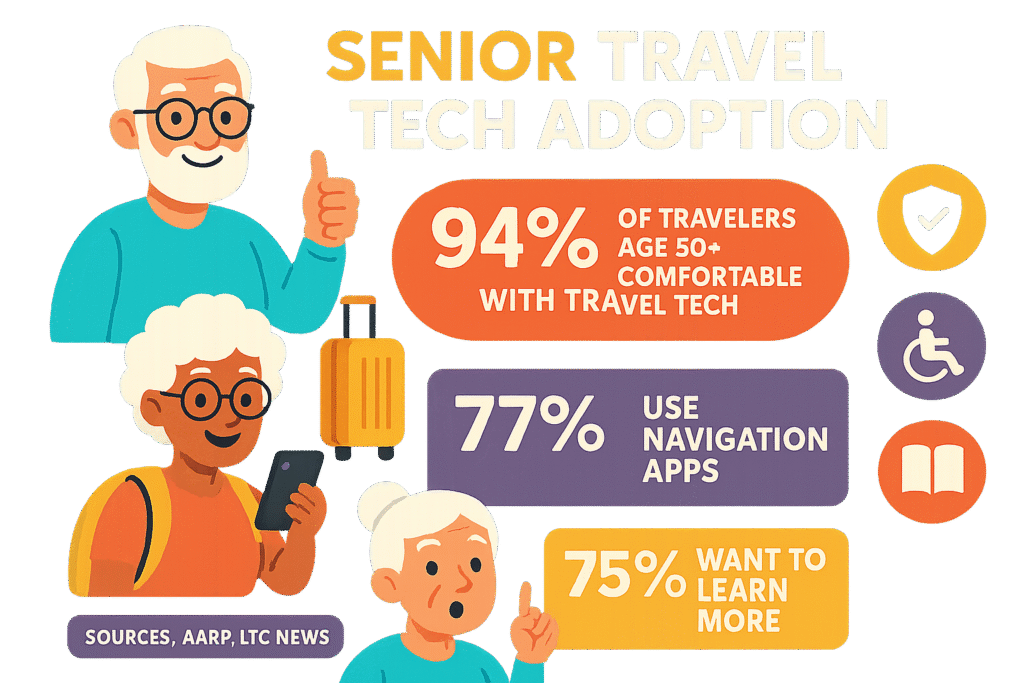
The hardest part of any trip is often the planning, right? Endless research, comparing prices, checking reviews—it’s enough to make you need a vacation from planning your vacation!
AI acts like your personal planning assistant, sifting through mountains of data to find exactly what you need.
Imagine telling a digital genie: “Plan a two-week trip to Italy for two seniors. We love art, good food, and gentle walks, but need step-free access and prefer a slower pace with plenty of time for afternoon naps.”
AI tools, often called “Large Language Models” like Google Gemini or specialized travel apps like Layla or Wonderplan, can instantly generate a detailed itinerary based on your precise preferences.
They can suggest museums with elevators, restaurants known for their comfortable seating, and even identify routes that avoid steep hills.
To get the best results, remember to be specific!
Instead of “Plan a trip to Paris,” try: “Create a 5-day accessible itinerary for Paris for two seniors in May. We’re interested in art, history, and pastries. Please include options for public transport with minimal stairs and recommendations for relaxed, sit-down dinners near our hotel. Ensure the pace is leisurely, with breaks.”
| AI Itinerary Builder | Best for Seniors (Key Features) | Why You’ll Love It |
|---|---|---|
| Layla | Intuitive interface, natural language prompts, custom pace. | It’s like chatting with a knowledgeable friend who remembers you hate rushing. Great for getting a first draft of your trip with personalized notes. |
| Wonderplan | Focus on activities, customizable interests, easy edits. | If you know what you like, Wonderplan helps fill in the blanks with suggestions tailored to your hobbies and activity levels. |
| Google Gemini | Integrates with Google Search/Maps, real-time info. | Perfect if you’re already familiar with Google’s ecosystem. It can pull in live data for events or opening hours, reducing outdated information. Just remember to verify major details! |
Finding a hotel with a roll-in shower, grab bars, or an accessible room isn’t always as simple as checking a box. AI can help you dig deeper.
By using AI-powered search functions on sites like Booking.com or Expedia, you can ask for very specific features and even comb through reviews for mentions of true accessibility, not just what’s listed in a generic description.
It’s about finding out if “wheelchair accessible” means a ramp or just a wide door!
Similarly, AI can help you research accessible transportation options. It can identify wheelchair-friendly taxis, public transit routes with ramps or elevators, and even highlight services that offer assistance for travelers with specific needs.
The accessible travel market is booming, valued at $76 billion in 2024 and projected to grow at an 8% compound annual growth rate through 2030, showing a clear demand for these specialized services.
AI is at the forefront of connecting you to them.
Your wallet will love this one! AI-powered apps like Hopper or features within Google Flights don’t just show you current prices; they use algorithms to predict when prices for flights and hotels are likely to rise or fall.
Think of it as having a crystal ball for travel deals.
These tools can even alert you when prices drop for your desired dates and destinations, including those elusive senior discounts that sometimes hide in the fine print.
Saving money and time are huge drivers for senior tech adoption, with 85% of seniors valuing the economic benefits and 77% appreciating the efficiency AI brings.
Once you’re actually on your adventure, AI transitions from your planner to your trusty on-the-ground guide.
Navigating new cities, especially if you have mobility challenges or simply prefer a more relaxed pace, can be a breeze with the right digital companion.
Gone are the days of fumbling with paper maps or getting hopelessly lost in a maze of unfamiliar streets.
AI-powered maps like Google Maps or Waze are incredibly powerful. But for seniors, their true magic lies in accessibility features.
You can often set preferences for “step-free routes” or “public transport with ramps” to avoid unexpected stairs or long walks that might be challenging.
Here’s how to set accessibility preferences in Google Maps (steps may vary slightly by device):
These apps can also help you identify less crowded areas or suggest routes that prioritize scenic, calmer paths over bustling thoroughfares. It’s like having a local expert whispering directions in your ear, always keeping your comfort in mind.
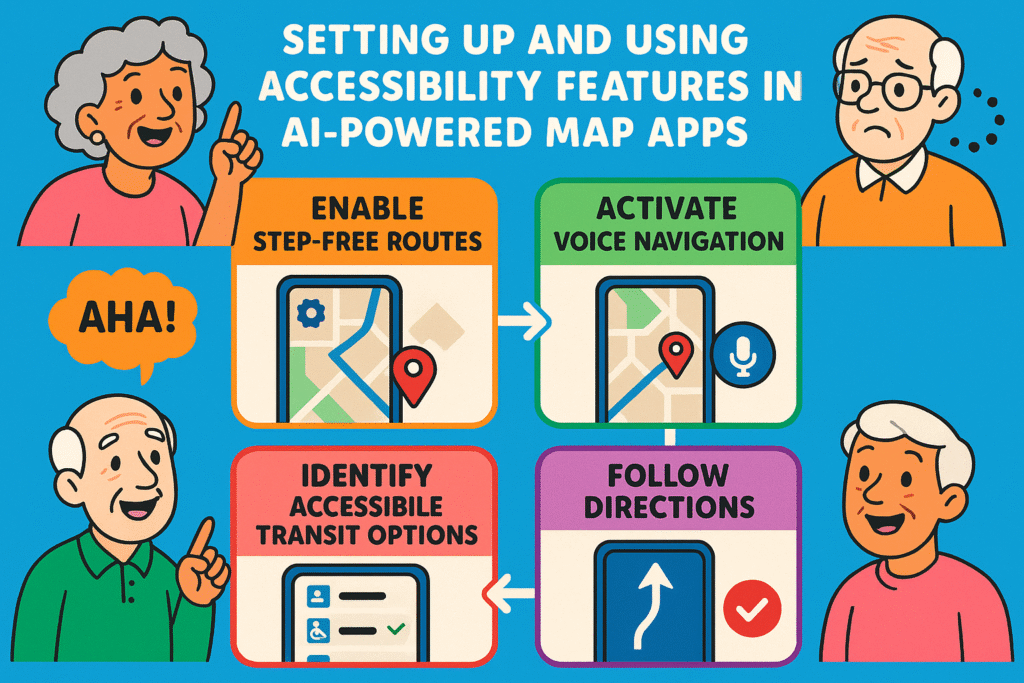
Trying to order dinner in a foreign country can quickly turn into an impromptu game of charades, which is charming until you accidentally order tripe instead of chicken.
AI translation apps like Google Translate or dedicated devices like Pocketalk are game-changers. Simply speak into your phone or device, and it translates your words into the local language, then translates their replyReply is a common feature in communication platforms and email clients that allows users to respond ... More back to you.
Many also offer image translation, allowing you to point your camera at a menu or sign, and voilà—instant understanding. It’s respectful, incredibly helpful, and prevents any accidental tripe incidents.
Your smartphone’s built-in virtual assistant, whether it’s Siri on an iPhone or Google Assistant on an AndroidAndroid is a type of operating system—like the brain of a device—that runs on many smartphones a... More, becomes an indispensable tool.
Need to find the nearest public restroom? Ask Siri.
Wondering what time the local pharmacy closes? Ask Google Assistant.
These AI-powered helpers can provide immediate answers to common travel queries, helping you out of a bind with just a simple voice command.
Beyond convenience, AI offers crucial support for your safety and well-being, which is often a top concern for seniors when traveling.
AI can act as a quiet guardian angel, ensuring peace of mind for both you and your loved ones back home.
Wearable tech, often paired with AI, is becoming increasingly sophisticated.
Smartwatches and fitness trackers can monitor vital signs, detect falls, and even call for help automatically in an emergency.
Imagine hiking in a national park or exploring a bustling market; if an unexpected fall occurs, your device could alert pre-set contacts and emergency services, providing your location.
This is especially reassuring when traveling in unfamiliar areas.
One of the trickiest parts of international travel can be managing medication schedules across different time zones. AI-powered apps are designed to handle this complexity.
They can provide personalized reminders, track dosages, and even help you locate nearby pharmacies in a foreign city for refills or forgotten prescriptions.
To learn more about how these can help, explore our guide to the top medication reminder devices and apps. This proactive approach ensures you stay on track with your health, no matter where your adventures take you.
With more online bookings and digital transactions, cybersecurityCybersecurity is a critical field dedicated to safeguarding digital systems, networks, and data from... More is paramount. AI plays a significant role in detecting and preventing fraud.
Many online banking apps use AI to spot unusual activity, alerting you to potential scams or unauthorized purchases.
When using AI travel tools, remember to use strong, unique passwords and be wary of unsolicited emails or messages.
AI helps protect your financial data, but a little common sense (and Senior Tech Cafe’s tips) goes a long way!
It’s completely normal to feel a bit hesitant about new technology, especially something as advanced as AI.
You might wonder about data privacy, how accurate the information truly is (“Does AI ever make things up?”), or if it’s all just too complicated.
These are valid concerns!
The good news is, AI is getting smarter and more reliable every day, and with a few simple strategies, you can use it confidently.
Think of AI as a very intelligent assistant, not a definitive oracle. It’s a fantastic tool for gathering information and suggesting possibilities, but it always benefits from your human judgment.
If AI suggests a restaurant, a quick look at its Google reviews is a smart second step. If it plans a route, a brief glance at the map can confirm it makes sense. It’s about combining the power of AI with your own seasoned travel wisdom.
Start small. Try using AI for just one aspect of your trip, like getting flight price predictions or planning a single day’s itinerary.
You don’t have to jump in all at once! And remember, Senior Tech Cafe is always here with tutorials and tips to help you every step of the way.
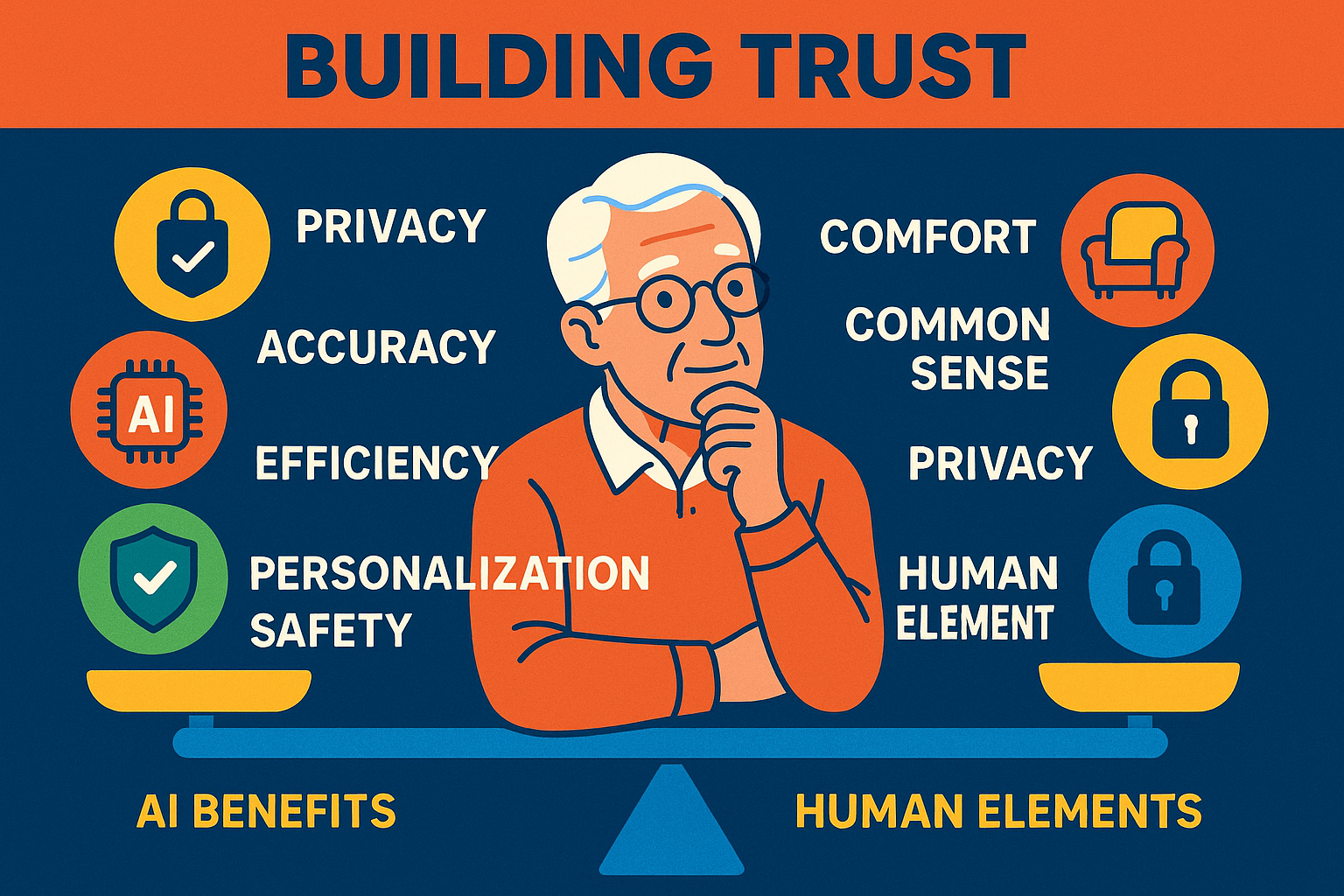
The world of AI is evolving at lightning speed, and future innovations promise even more tailored and accessible travel experiences for seniors.
We’re talking about AI-powered robotic companions that could assist with luggage, advanced mobility aids that predict your needs, or virtual reality tools that let you “try out” a destination’s accessibility before you even leave home.
The possibilities are truly exciting, and Senior Tech Cafe will be here to keep you updated on all the best new tech.
Yes, when used wisely. AI tools help you research and plan, but always verify critical information (like booking details or addresses) with reputable sources. Be mindful of data privacy by using established, trusted apps and services, and avoid sharing highly sensitive personal information unnecessarily.
Absolutely! This is one of AI’s strongest advantages for seniors. You can promptA prompt is the message or question you type in to tell an AI like ChatGPT what you want it to do. I... More AI to find step-free routes, hotels with specific accessible features (like roll-in showers), or public transport options that cater to mobility needs. The more specific you are in your requests, the better AI can tailor its suggestions.
Not at all! Many AI tools are designed with user-friendliness in mind, using natural language that makes them feel conversational. If you can type a question or speak into your phone, you can use AI. Our goal at Senior Tech Cafe is to make these tools even easier to understand and use.
Data privacy is a valid concern. Stick to reputable AI travel apps and platforms that clearly outline their privacy policies. Be cautious about sharing overly personal details and remember that free tools sometimes use your data to improve their services or target ads. It’s always a good idea to read the fine print.
Start by identifying your biggest travel pain points. Are you looking for itinerary help, navigation assistance, or language translation? Then, research apps that specialize in those areas, focusing on those with clear, intuitive interfaces and positive reviews from other senior users. Try a few free options to see what feels most comfortable and effective for you.
The world is waiting, and with AI as your smart travel co-pilot, those once-daunting travel dreams are now more accessible and enjoyable than ever.
This isn’t just about making travel easier; it’s about empowering you to explore with confidence, maintain your independence, and create incredible new memories.
So, are you ready to ditch the travel stress and embrace the ease of AI?
Start small, experiment with an appAn app (short for application) is a program that helps you do specific tasks on your smartphone, tab... More or two, and discover how this incredible technology can transform your next adventure into your most effortless and unforgettable one yet.
The open road (or the accessible path!) is calling, and your AI co-pilot is ready to navigate.